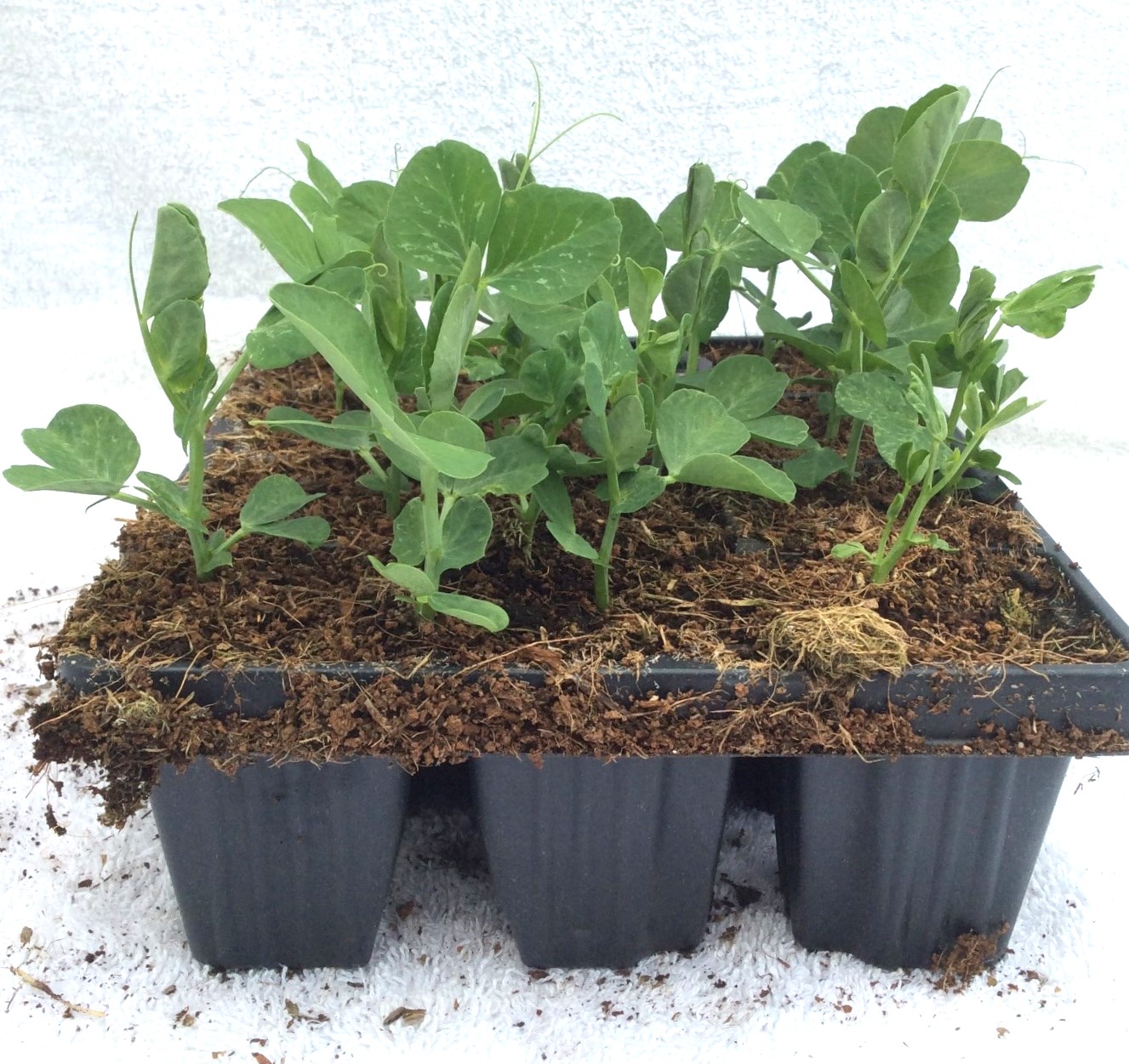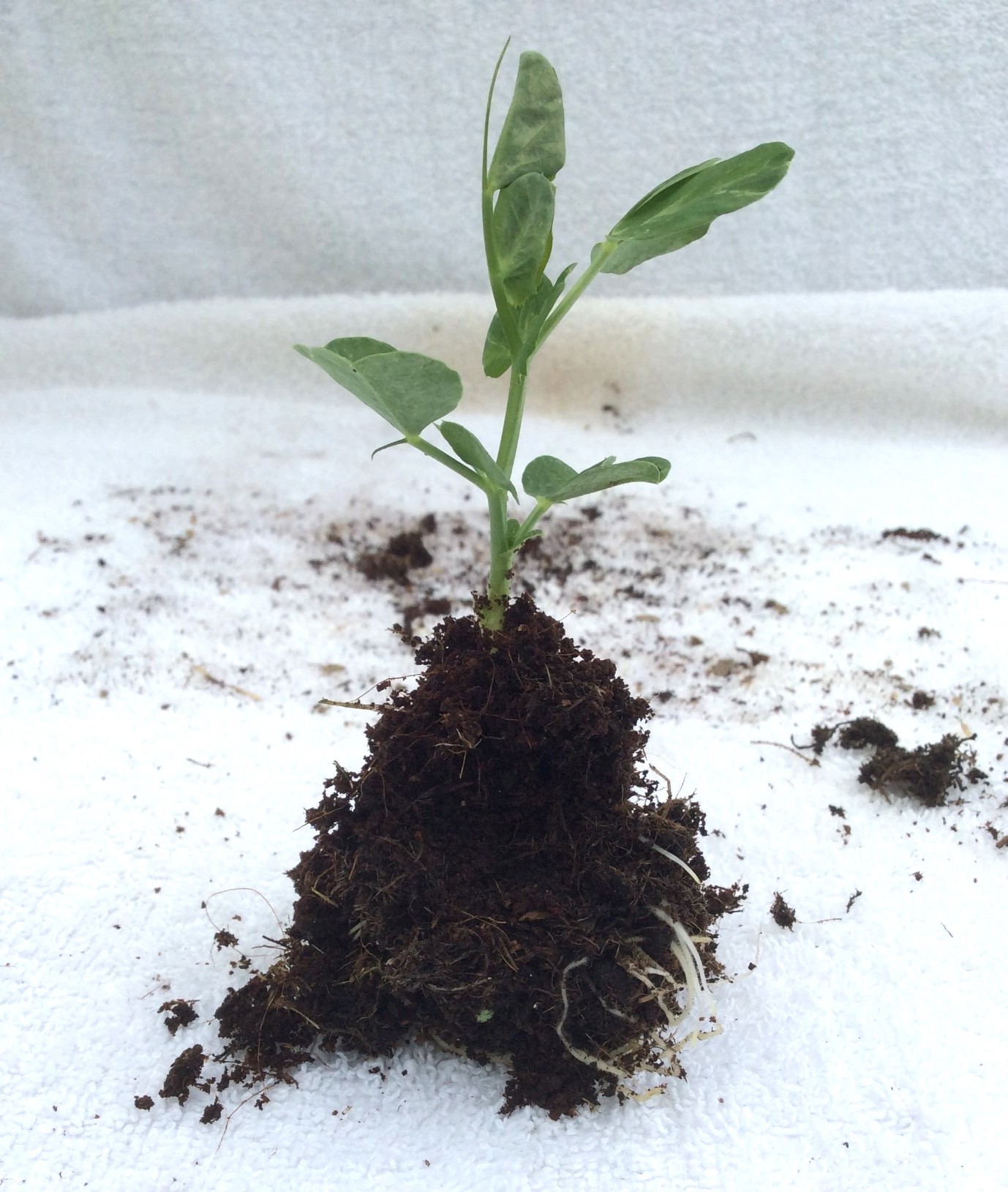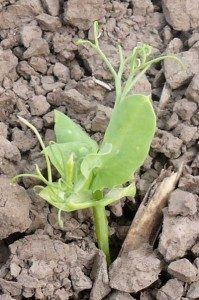Spacing – 5cm apart.
Early planted peas will be ready to harvest in late June, but main crop varieties will be ready for picking later in the summer and will go on until October. Sugar snap and mangetout will be ready from June to September. They are much easier to grow and are eaten in the pod – so don’t need podding! Try some of each!
Peas will grow well in containers, raised beds or the vegetable garden.
Plant peas outside when they are 20cm tall. But first harden them off by putting them outside during the day for a week.

Prepare the ground by loosening the soil, raking it level and firming it down.
Water the tray of seedlings the night before planting so that the compost is soaked. The root ball will then hold together when the peas are transplanted which will be less stressful for the peas.
Gently remove a plant by tipping the tray upside down whilst one hand is spread over the plants. Slowly pull one plant out of the tray.

Without disturbing the roots, place the plant in a hole which is just slightly bigger than the root ball. Then push the soil around the root ball so that the plant is firmly held upright. Firm the soil down. Repeat this with the remaining plants in the tray so that they are 5cm apart. To plant several rows, space them at a distance equal to the expected height of the variety. Tall varieties need more space between the rows than shorter varieties.
Water the plants immediately after planting with a gentle spray so that the soil is soaked. Water every day so that the soil remains damp, but not waterlogged, until the peas are established and growing well.
Once the peas are established, they will not need much water. In fact they do better if they are kept on the dry side until the pods are formed. The pods may need a little water to help them fill.
Always water at the base of the plants so the leaves do not get too wet because that may encourage mildew.
Weeds. Remove weeds with fingers as soon as they appear.

Support the pea vines so that they grow upwards and do not spread over the ground. They will be healthier if there is plenty of air between the leaves. Also they will get more light when standing in a row, produce more peas, and be easier to pick.
Twiggy branches. stakes, sticks, chicken wire can all be used. Put the support close to the plants as soon as they are planted and the growing tendrils will cling on so that the plants can grow up. They do not need tying in as the tendrils hold on themselves. Make sure the support is fixed firmly into the ground, because the pea plants get very heavy, particularly when it rains. If you have a wall that gets some sun, wire mesh can be fixed to the wall and the peas will grow up that.
Shorter varieties can be held up with twigs and sticks. Taller varieties do better with chicken wire or mesh fixed between two stakes at the row ends. Dwarf varieties don’t need staking.
Protect pea plants from birds. Pigeons like to eat the young leaves. Pea sticks should keep the pigeons off but if birds are a nuisance hang ribbons, CDs or beach windmills above the plants to scare the birds away.
Harvest normal/regular peas when the pods have swollen and contain small peas. Open the pods to check the size of the peas. Do not let them get too big or dry. The peas should still be bright green when picked and juicy. The lowest pods will be ready first, so search below amongst all the greenery. Pick the lowest pods first.
Sugar snap and mange-tout peas are eaten in the pod just after the young peas have started to develop. They do not need podding. Pick them when the pods are about 7cm long.
Pick regularly so that the plant keeps producing. Do not leave any old pods on the plant. If there are too many to eat, give them away or freeze them.
Plant a selection of varieties in successive batches. This will give a continuous supply of peas and an opportunity to see which sort you like best.
Mon - Fri 8:00am - 5:00pm
Sat & Sun 9:00am - 5:00pm
Any questions? Email us or give us a call on 01904 400092.